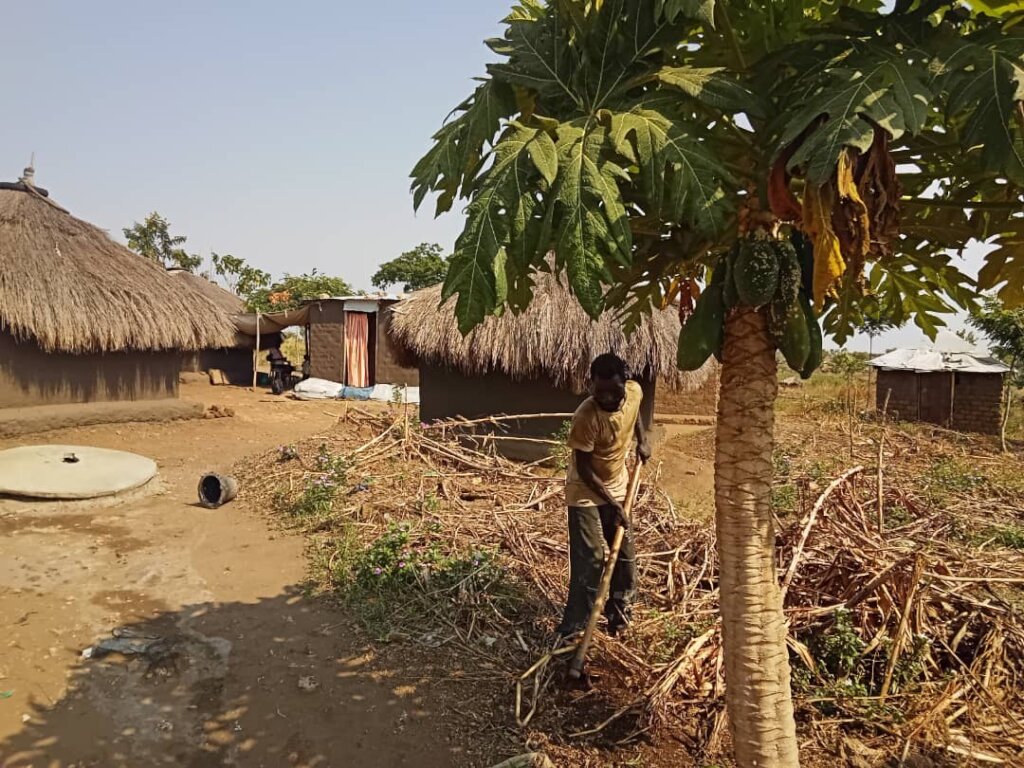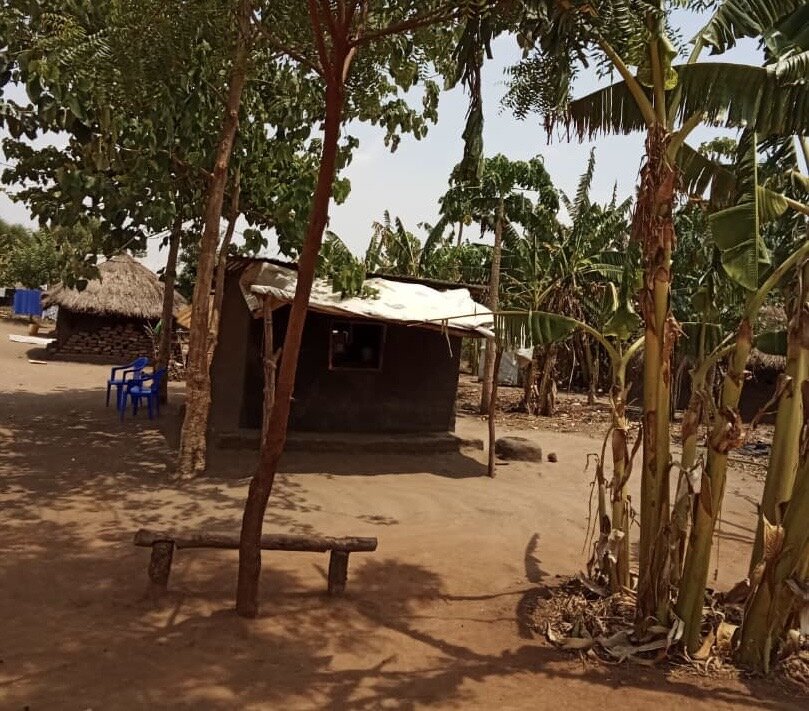By Cathy Watson | Chief of Partnerships
Life is always eventful in a refugee settlement. We have been privy to forest crime. You heard that right. Forest crime. But first I want to talk about something more edifying: trees for refugees with disabilities. In this project, we are proud to be assisting at least 18 households where the family heads are visually impaired or are living with other activity-limiting deficits such as lameness that creates difficulting in walking.
(Writing those words I am aware of language. I could say people with special needs, or use the term specially abled. I am following the example of the UN Refugee agency, UNHCR, which uses "refugees with disabilities". I so sorry if for some that is not the phrasing you prefer. I understand.)
At 54, Joel is our longest serving and most experienced outreach worker. He started with us in 2018 and, with a Diploma in Forestry and a Degree in Social Works and Social Administration, is ideally suited to be attending to families affected by disability.
Hearing him describe one household that is doubly affected by disability, my immediate thought was "Oh no, how did they make it across the border from South Sudan? How did they flee?" The social worker in him responded "Those are sensitive questions that require gradual entrance. You do not ask right away".
Jackson and his wife are in their thirties. He is almost blind and has a weak misshapen leg. She suffers from epilepsy. They have a two year old child. "Living with disability in a refugee settlement means you will not access many things," explains Joel. "In most cases, the community neglects such people."
Given their needs, what we have done is not a lot. Their lives are still hardscrabble, their plots largely baked brown in the dry season. But our project has brought them hardwoods like Milicia excelsa (Mvule/Iroko), the exotic fast grower Senna siammea, which refugees like as a compound tree, Melia volkensii for poles, and Carica papaya (pawpaw) for fruit.
They are particularly happy with the pigeon peas seed we gave them: Cajanus cajans is a shrub that gives food (the pea), fodder, shade for small livestock like ducks, nitrogen and mulch for soil, and fuel from its stalks. "They plant them around the boundaries of their plots and, because it fertilizes crops, even now they have prepared their food garden to plant more pigoen peas," says Joel.
And the community does sometimes step up. Last time Joel visited the couple, they were enjoying the fruit of the Borassus aethiopum, a wild growing palm, that a neighbour had brought them. Our community-based facilitator (CBF) Joseph is working in Village 18, Zone 3 with a household where the male head has had a stroke. According to Joel, "He is just down, and his children have matured and are scattered in South Sudan".
It is really heart warming that our CBFs and senior outreach workers, Joel and Gertrude, took it upon themselves to do this. Refugees with disabilities were not part of our mental map when we started in 2017. Now they very much are. In rather blurry photos taken on low res phones, see our nursery worker Patrick going an extra mile to weed Jackson's food garden and CBF Beida guiding a completely blind refugee on how to collect water in the absence of his wife.
Now onto to forest crime. According to the UN Office on Drugs and Crime, forest crime refers to the illegal exploitation of the world's flora, and is on the rise accross the globe, particularly in poor tropical countries. The UN FAO's 2020 Global Forest Resources Assessment Report, meanwhile, notes that "Africa had the largest annual rate of net forest loss, and that forests in West, Central, East and Southern Africa are particularly vulnerable to the ellicit exploitation of high-demand endangered trees, putting biodiversity, local economies and humans at great risk".
One of those high-demand trees is Afzelia africana. This species is currently being taken out of the refugee area. No one knows for sure who is extracting these trees or where they are going but demand is known to be strong in Vietnam and China. Our team was devastated this week to see that the largest and most towering Afzelia in our zone had been removed overnight. All that was left were a few branches. Conjecture is that local people will turn them into charcoa, a tiny short-lived dividend from the demise of a giant.
Afzelia is not a fast growing tree. The oldest of those we have planted date from 2017 and are not more than two meters tall if that. It is a sore loss. Nothing we plant is likely to ever attain the size of that tree, certainly nothing in our lifetimes. Forest crime is one of the downsides of the new roads that were put in so that the UN, government and NGOs could the serve refugees. We had known these trees were being taken. But it had never come so close.
We thank you for your incredible support. Your donations just keep coming in. We are not disheartened - more like marveling at the challenges faced by these households coping with disability and our threatened landscape.
We remain as strong in cur commitment as ever. And we have the planting season to look forward to. "The clouds are building up," says senior field officer Joel. "It's a sign of rain coming anytime now." For us and the refugees, it is a sign of hope.
Links:
Project reports on GlobalGiving are posted directly to globalgiving.org by Project Leaders as they are completed, generally every 3-4 months. To protect the integrity of these documents, GlobalGiving does not alter them; therefore you may find some language or formatting issues.
If you donate to this project or have donated to this project, you can recieve an email when this project posts a report. You can also subscribe for reports without donating.
Support this important cause by creating a personalized fundraising page.
Start a Fundraiser
